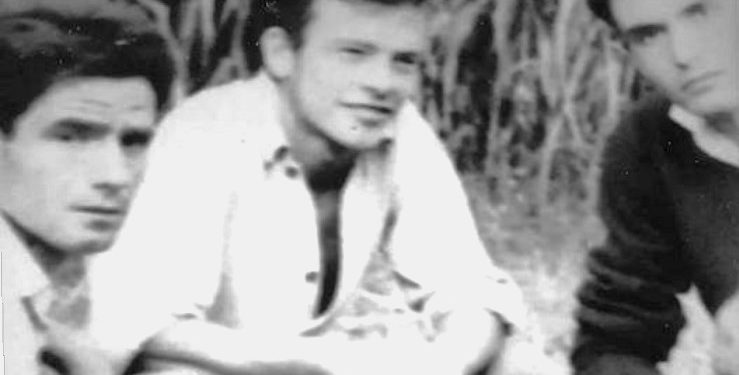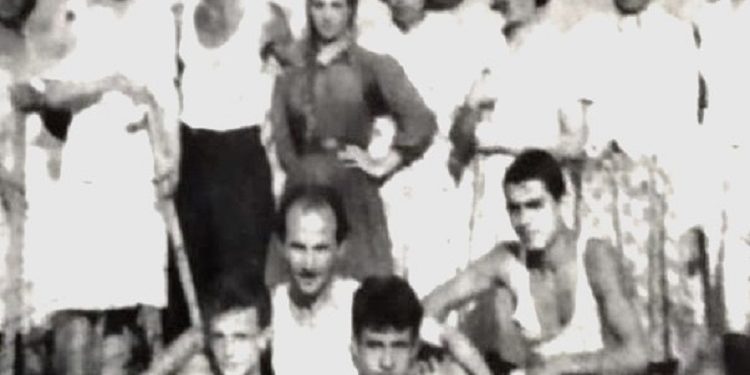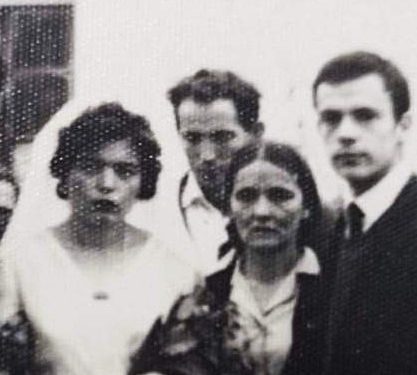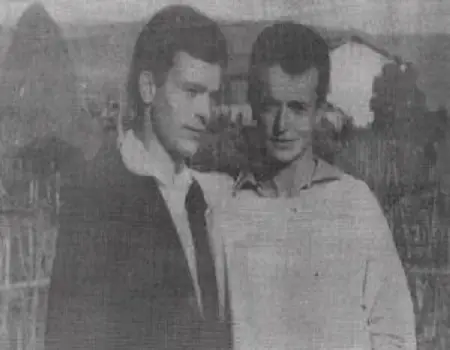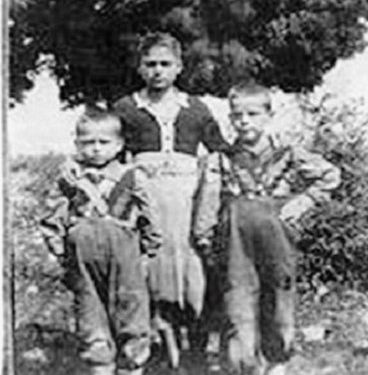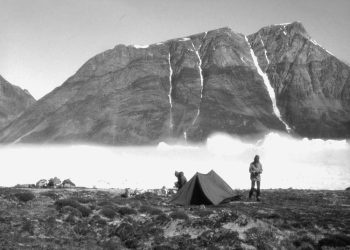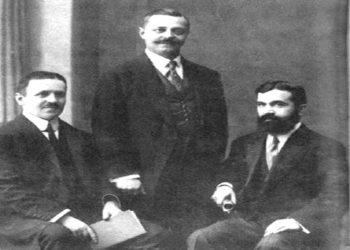By SIMON MIRAKAJ
The ninth part
“Camps under the shadow of Tomorri, 44 years of internment”
– Memories –
Memorie.al / I put these memories down on paper after a long period of hesitation. This is probably because the subjects were always fresh in my mind, which followed me mercilessly during the years after the fall of communism. But there comes a moment – when time takes its course – and the images of horror and suffering came fading to me – almost the suffering passed into oblivion. Then I decided to repeat the most impressive events – first in my mind – until they took the form of these narratives. As dim as these accounts may seem – they create the idea of the harsh reality and misery of the camps.
Continues from last issue
Channel opening
I finished work quite tired. It was hard work deepening the line, which went eighty cm. deep. It was the end of May, the heat of this month made the work even more difficult. I sat at the end of the line and took the bucket to clean the shovel so that I would have it ready for the next day.
I was hungry. I ate bread for lunch from 11 o’clock. In the morning, as usual, I ate bread with tea. I had a small pot as measure, which I definitely had to eat, to cope with the work. The tea could not stand the shovel. Around 10.30, 11.00, the knees couldn’t hold, they couldn’t resist the shovel. The brigadier would come and say, throw the dirt, eight meters away.
At 11.00 I left the shovel and started eating lunch. I shook the bread from the flies that had entered the bag and poured water that had become boiling, like morning tea. I rested for a while so that the bread would go to my place, I started work again. All over the plot, I watched the workers turn their shovels at the same time, almost as if someone was directing them, as the soil of the shovel crumbled with the impact of the corn plot.
While the women with hoes in their hands, half bent, and were hoeing the corn that had become crusted from the irrigation. From 12.00, everyone went on hunger strike, to get energy, to continue and do the norm, 12 cubic meters, to get 170 ALL, where ten percent was kept by the state, to give to end of the year; in fact we didn’t even get them for a year. After the bread, all the workers lay down under the shade of the poplars to rest.
I, after doing the norm, got permission from the brigadier and went home, to the sector where we lived for years, in Gjaza. The road to the sector was almost two kilometers, from fatigue, hunger and thirst; it seemed to me that I would never arrive. The road was all dusty and empty. The loneliness of the road was broken by a cart with the rumble of its wheels, so that it seemed as if they were groaning.
I was wearing a pair of half boots, I took them off because they weighed me down, I also took off my coat, because it seemed to weigh me down too, my eyes were getting dark from hunger, there were fields of wheat on the side of the canal, we could hear the sounds of our oxen, whistles, which scared the birds, who threshed wheat in bunches.
“What if I go in together with the birds, to quench the hunger”! – I said to myself, it didn’t seem like a bad idea. I crossed the canal, walked a little through the wheat, and opened a place. I went to the water line, filled a bottle and returned to the target. I started to collect the ears, I cleaned them by hand, the peeled grains, I threw them into the bin. The wheat was soft, not ripe; I made about half a kg.
That’s how I “laid the table”, the can of wheat, the bottle of water. I started to eat; it seemed as if my stomach was also feeling pleasure. At the mouth of the bottle, I put the jug and drank water, wetting my lips, which were almost crusted. It flowed well, my stomach was swollen more from the water, I couldn’t move.
I lay down on the wheat, opened my arms and looked up at the sky, perfectly blue without a speck. Dreaming, I fell asleep. At sunset, I hear the guard saying to me: “Wake up Simon, because you’re going to be late for the appeal.” – I stood up, thanking him, washed my eyes a little, took my way home.
Rainy day
A thin layer of fog covered the sky, from the balcony I watched people walking the sidewalks with open umbrellas, and a heavy rain had begun.
While I contemplated the rain that was falling non-stop, my memory took me to stop in Gjaza, where I spent 20 years, heavy years from work, and heavy years from uncertainty about life. We were called “enemies”, from the cradle, every day we faced injustice.
As the rain continued at the same rate, I remembered the rainy days there in the camp in Gjaza. When it rained, we were glad to rest, our ribs rested from fatigue, we were paid 80 ALL (old), that day we read a book, listened to music, played chess, in the afternoon we played poker, so we had some fun…!
This payment, which was called a rainy day, continued all the time but with one change, to get it you had to go to the “Red Corner” and “listen to the works of Comrade Enver”.
A torturous invention for us, the work was read by the brigadier who could barely collect the letters, then he would ask you questions about what he had read, so you could comment on it. Fear and torture together, you had to control it well, because every word was interpreted according to their ignorance, which would even lead to prison.
So the rainy day didn’t give us pleasure anymore, it was better to work and go to work even though it was raining, than to go and be tortured, listening to what had taken your life, that your life was in danger at any moment.
Although the rain had started at night, it continued without interruption during the day. After the appeal, I turned to the brigadier to get the work plan in the “Red Corner” and he told me that; “If the rain stops, you will open lines in Kodolesh”. Kodoleshi from the camp, it was two kilometers, when it rained, the road was difficult to walk, slippery ground, you had to stick the shovel, so as not to slip.
We decided together with our colleagues to go to work even though the rain continued to fall, rather than going to the “Red Corner”. We had sewn a raincoat, we held on well with shovels in our arms, the bag of bread and we set off together with my brother, Sokol.
On leaving the camp, we joined Gjon, Dina, Tomorr, Sazan, Sali, Xeladin, Myftar and Nexhat, who had with him the dog “Beluli”. The rain had stopped, we continued on our way to work, hoping that time would open up.
We walked one after the other, because the road was narrow, the embankment of the canal was narrow, no more than 50 cm. width. The road took an hour; the rain increased the density, as if to our anger, we had nowhere to sit, as the trees had been cut down. We sat cross-legged, to rest a little, “what shall we do”; we asked each other…?! Some said; “Let’s hope it doesn’t stop”, some said; “let’s go back”.
It was 11:00, at 11:30; we left for home, under the heavy rain. The rain had penetrated our bodies, we had become porridge, the raincoats had not resisted, because the rain was also accompanied by a strong wind.
When we approached the sector, no more than 200 meters, we had the channel in front of us, which was filled to the brim by the swell, the width exceeded 4 m. and now, we either had to jump, or fall around, which took another hour, to get home. John said:
“I can’t jump anymore, I’m falling around…” – he started. We stopped, dropped our shovels, and emptied our bags on the way. The youngest jumped in first, the two brothers Agolli, Saliu with Xheladin, I jumped in, one of my feet slipped and I was filled with water, I got out on my hands and feet, the others jumped in too. The dog swam past, the last Tomorri was left.
“Hey Tom, what are you going to do”?
“I’m going to take a leap and jump…- he said, – I fell in a big deal, we’re in the water, we have nothing to save anymore”. Tom jumped and fell right in the middle of the canal, only his head was visible, he caught us laughing and him with us, we held out his shovel, he caught him and got out.
It was no longer wet from us; we all looked like we had fallen through the drain. When we entered the camp, Tomorri’s wife, Skurta, had come out on the street, when she saw us, I don’t know, Tomorri seemed more confused, and addressed her:
“O Tomorr, how did you become like this, you were wet and turned into porridge, but has anyone else become like you”? Tomorri, who was in a good mood, turns to him:
“Yes, I fell into the canal.”
“What about you alone on the channel”?
“No, Beluli also fell.”
“But who is this Beluli”?
“Beluli is Nexhat’s dog…”, – Short and we all started laughing to tears, Tomorr’s humor seemed to dry our clothes and put some warmth in our bodies, which were shivering from the cold.
Easter celebration in the internment camps
We have always celebrated Easter, despite the economic difficulties, I remember Easter, that it was accompanied by coloring eggs, which for the children of that time, were a special pleasure, this is also the reason for remaining in my memory, that in the camps, we celebrated both Christmas and Muslim women celebrated Eid.
We also celebrated Easter in the infamous Tepelena camp, where our mothers were struggling that day, with father or mother, but what has remained in my memory are the two priests of the camp, Father Jak Gardini and Father Viktor Volaj, who on the day of Easter, they went around the camp with two baskets, distributing red eggs to the children.
In the Savra camp, when religion was not yet banned, for Christmas and Easter, mass was held in the camp canteen or in the corn cobs, of course with permission from the Department of Internal Affairs. In the Savra camp, we had Father Marjan Prela, who celebrated mass, as well as Dom Nikoll Mazrek.
Dom Lazër Jubani, Dom Mikel Koliqi, Dom have come from Gradishti to celebrate mass in Savër. Follow Sahatçia. We, even later when the churches and mosques were destroyed, celebrated Easter, Christmas, the Muslim Eid, but the celebrations were only at home, under strong security measures, for Easter we colored eggs with preserved onion peels, or with paint that dyed jerseys.
After eating the eggs, we put them in the stove and the children ordered that; don’t tell you that; “if you show that we swallowed eggs, then we will be put in prison”.
Wherever we have been, we have celebrated Easter, Christmas, Eid, despite the danger, because faith in God was for us the only hope, the only support that gave us strength to face the ordeal of suffering. In Gjaza, where the class war in 1973-1974 had reached its peak, innocent people were arrested and sentenced to capital punishment and prison, but religious holidays were always celebrated.
After we called the police in the morning, I was walking with Deda Gjon Markagjon, he was quite a nice man even though we had a difference in age, he found the language, both young and old, when the time was approaching 11.00, Deda told me:
“Simon, did you go to Gjin Kaziu for Easter?”
“No, I tell him. – Shall we go together?
“We go with great pleasure.”
Gjini was a noble man from Mirdi, interned with us as early as in Tepelene, an honest and quite dignified man. Gjini had a wife, Dila, a son, Palin, and his son’s daughter-in-law, Gjysten, at home. He was a man with a lot of authority in the family, he was a little angry, but even when he was angry, he was a charming person.
The son’s daughter-in-law, also from Mirdita, very hard-working, just like Pali (her husband), although she treated them quite well, like father-in-law and mother-in-law, Gjin had lost a little bit of authority, since the daughter-in-law had entered the middle. The half-wife was very hospitable, she had bought red peppers and dried them for the winter, and she had spread them on the sole of a bunker, which was about 20 meters long, well, to protect them from the chickens, she had sent tulips to Gjini.
It was July, it was very hot, and the concrete that was laid on top of the bunker added to the heat. In that heat, Gjini used to walk around on the sole with a tobacco pipe in his mouth, wiping the sweat with one hand.
Opposite the bunker was the house of the Markagjons, the July heat was scorching. Frida, who lived with Markagjonet, had gone out to the yard and was enjoying the sun, when she saw Gjini, who was smoking and coming and going above the bunker. She knew that Gjini did not enjoy it, although she respected it.
He didn’t like Frida, because she wore long nails, painted her lips, although she was over 70, had grown up, educated in the West in Austria, and had served 15 years in political prison. Knowing Gjini and his nature, Frida calls him:
“O Lal Gjini”, but he didn’t turn his head at all and continued his rounds on the bunker, releasing plumes of tobacco from his mouth, which disappeared into the sky. She calls him back:
“O Lal Gjini”!
Without turning his head, he takes the pipe out of his mouth and says:
“What are you talking about”?
“What a host your daughter-in-law is, she kept the peppers for you”!
Gjini, without turning his head, but frowning, says:
“Yes, I have a host, I put the peppers in, and I… the mother.”
Frida had started laughing the loudest, while Lal Gjini continued to smoke and wiped away his sweat. This happened a few months before I went to visit Deda for Easter. While we are approaching Lal Gjini’s house with Deda and entered the yard, Deda calls out to him:
“O Lal Gjini”, and he immediately opened the door;
“Come on, God has blessed you.” We went inside, wished them Easter. Mother Dila put the table in front of us and Gjystja prepared the brandy, winter eggs, garlic and cheese,
Gender filled our glasses; “Welcome you came”. – “Kjofte livdue Jesus Christ”, – “Always of life”, answers Lal Gjini. We started drinking and chatting, I had no idea about brandy, I just drank it and, more like, I enjoyed the appetizers. I put the shawl on Lal Gjin, I say:
“O Lal Gjini, how good was this brandy”?! – “What do you say Simon, drink it and eat it… it’s not brandy, its ouzo”! I put my lip on the gas; “I mixed it up – I told him, – they said I wanted ouzo, I said raki”. Neither Lal Gjini nor Nan Dila is alive, but for us, they are unforgettable and will always be remembered with respect, as they were wonderful people, like family.
The Christmas tree – Gjaze 1977
We used to decorate the New Year’s tree on St. Kol’s Day at dinner (December 6). December was a month of holidays, such as Saint Kolli, Christmas and New Year. Santa Claus and Christmas were celebrated inside the walls of the house, while the New Year was celebrated without closed doors.
I was sitting in front of the tree, where my son (Pali) had placed it and was decorating it, at first he put the lights, then he started to put the decorations and, after he finished, he asked me: “Daddy, how does it look?”
“Good enough bless your hands.” I couldn’t help but remember the tree we made in the internment camp, and the children who happily awaited its construction and constantly asked: “Dad – aunt, when will you start the New Year tree?”
From the middle of December, you could see many of the workers in the belt, who had a small spat, where after work they climbed the trees to make and cut the New Year’s tree. As I said, we started setting up and building the New Year’s tree on December 6. At dinner, we would put the tree in a corner of the room and start decorating it.
The children’s eyes were shining with joy. At first we took a handful of cotton and spread it on the tree, then we put colored paper strips, postcards, fairy candies, near the tree we put a couple of wax candles, which we made ourselves, to light up the tree a little. The tree was poor in decoration, but the children enjoyed themselves together with them.
For the New Year, they gave us 5 eggs, 50 gr. butter or margarine, 100 gr., 2 kg. Oranges (the oranges were not put in the mouth, because they were sour) 3 kg. Apple, ½ walnut, ½ l. wine, ½ fruit brandy, or “Juniperus” and 100 gr. 600 coffees. This was the New Year’s ration that we bought at the store.
I remember how we celebrated St. Kolli’s night, in exile in Gjaze (Lushnje). That December day, I went to work with a shovel in my arms, to clean the canal. The channel was deep, I started work, the mud of the channel stuck to the shovel, which had to be cleaned from time to time, and cleaning the shovel gave me the opportunity to take a breather.
I came out of the canal to drink some water, when I saw that Brigadier Feçorri (that was his name) was coming towards me, as he had his name and his soul. He was accompanied by another, when they approached I noticed that the other one was operative Selfo, they said he was from Tepelena. I continued digging the channel; they stopped and pretended to talk.
Feçorri was very pleased to accompany the operative and of course gave him information about us. Operative Selfo was certainly pleased to see me working in the canal, covered in sweat and mud on my face. But I wasn’t impressed and I continued working, cursing them “May the night of Saint Kol come to you, take Katila”!
At dinner, we gathered around the table, where the candle light shone in the middle of it. We made the cross and said the bridge. We prayed to Saint Saint-Koll, save us from all evil and get rid of this bad seed. After the greetings, the dinner began, where we tried to make something as if it was a celebration, and it stood out from other dinners. We celebrated all holidays, of course under strict security measures. Memorie.al
The next issue follows




